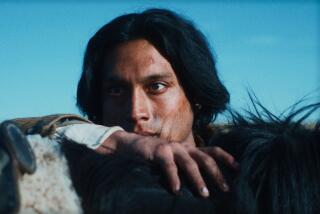Journey of a Cowboy Who Stops Following the Herd : MEN DOWN WEST by Kenneth Lincoln; Capra Press $15.95, paperback; 250 pages
- Share via
Kenneth Lincoln grew up, literally, among cowboys and Indians. One of his Nebraska ancestors was a cattle rustler. His adopted brother is Sioux. His father worked at a grain elevator, lugging 100-pound sacks of beans, drinking himself into a stupor at veterans’ clubs, dying, finally, closed off from his loved ones, believing a man should “bite the bullet” and not complain.
Lincoln rebelled against this frontier idea of masculinity, even as he recognized its stoic virtues and its roots in the violent history of an unforgiving land. He became an intellectual, a poet. For the last quarter century, he has taught contemporary and Native American literature at UCLA. Divorced at 30, he raised his daughter, Rachel, as a single parent--the act, he says, that “made a man of me.”
A man’s got to do what a man’s got to do. But who can be sure what that is anymore, a century after the frontier closed? “Men Down West” is Lincoln’s account of his lifelong search for answers.
“I wasn’t taught mothering as a postwar redneck,” he says. “It opened me up to remake myself with this child--pondering a woman’s humbling by the home fire, a man’s humbling at the office. And I began questioning our choices, our patterns, our genders . . . thought twice about American men and women--then began a long course in male re-education.”
This is a shaggy, if endearing, book that could have used more editing. Moving portraits of Lincoln’s family and friends alternate with predictable rants about Los Angeles as a tarnished paradise and about America’s heritage of phony heroism, from George Custer to Ollie North. Vivid poetry (by Lincoln and others), Native American wisdom and descriptions of landscape (“Amber bars of sunlight angle over the desert like stage lights as storms roll in”) give way to slapdash social analysis.
*
Lincoln shows his best writing in the very first scene. His mother, after 46 years of marriage, has left his father, who grabs the family shotgun and tells Lincoln he will shoot her, then commit suicide.
Lincoln pleads: “ ‘You can’t do that, Dad. You’d be killing my folks.’
“He rolled his jaw, then bit down. ‘Well, you’ve got a point. . . .’ Dad’s brow tightened, his eyelids reddened. ‘. . . I don’t know. . . .’ Something broke inside him. ‘I’m still mad enough to do it,’ he said fiercely.
“Whether my father would have murdered my mother, then shotgunned himself, I’ll never know. He was not himself. Dad had been fired from his . . . job . . . for drinking. He was ‘bitter as alkali, refusing therapy.’ ”
In contrast, Lincoln can never quite bring his ex-wife, Ann, into focus for us. She leaves him and Rachel when the child is 3, as inexplicably as the Meryl Streep character in “Kramer vs. Kramer.” This vagueness extends to his relationships with several other women in the years when he was raising Rachel, winning tenure, battling depression and trying to integrate his blue-collar self with the academic.
It’s no crime to be confused about the opposite sex. Lincoln has plenty of company there. And to honestly admit that one is confused, in an age ringing with false certainties, is a good way to begin the kind of inquiry he undertakes in “Men Down West.” But unless the confusion is resolved, there’s risk in using his personal experience as the basis for broader theorizing.
Indirectly, in excerpts from letters and journals, Lincoln’s father and daughter make his points as well as he can.
The father’s last notes, close-lipped and stubbornly trivial, betray his despair in the face of death: “Guess the ‘old gray stud’ ain’t what he used to be. Have had some dull aches in my lower back. . . . Not much exciting news around here.’ ”
Rachel’s writing is richly observant and full of emotion--a sign that Lincoln, as a parent, didn’t do at all badly: “Eight years after I walked out of his condo screaming . . . four years after we made tentative peace when I went away to college and he broke down--sitting across the table in the low yellow light, we sang together. I opened my throat, and the harmony was true and good.”
Together, these witnesses lend credibility and urgency to Lincoln’s appeal for Western men to “let off the gas pedal, soften the jaw, sheathe the sword.”
More to Read
Sign up for our Book Club newsletter
Get the latest news, events and more from the Los Angeles Times Book Club, and help us get L.A. reading and talking.
You may occasionally receive promotional content from the Los Angeles Times.










